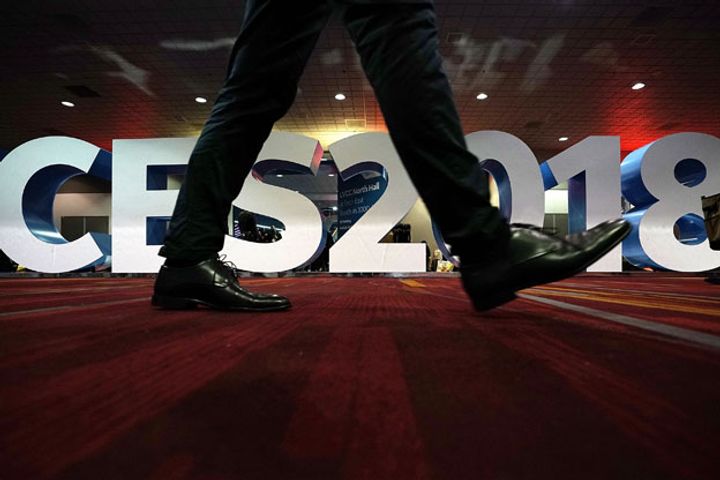 China Dominates Asian Presence at CES 2018
China Dominates Asian Presence at CES 2018(Yicai Global) Jan. 10 -- A record number of Asian companies registered for this year's CES. Visitors from Asia have cropped up at airports, hotels and streets in Las Vegas since the opening of the global technology exhibition, and more than half of them are Chinese.
An estimated 3,900 exhibitors are attending the event, per a preliminary report Yicai Global obtained from the organizer.
At least 482 Shenzhen-based tech firms signed up for the show. Other Chinese exhibitors are mostly from Dongguan, Beijing, Guangzhou, Ningbo and Shanghai. The consensus is that CES 2018 has attracted over 1,000 Chinese companies.
"The number of Chinese exhibitors has increased," said Brian Moon, international sales and business development vice president at the Consumer Technology Association, which organized CES. "They want to improve their brand image on the global market and find foreign partners."
Such attendees come from a diverse range of electronics markets including those for autonomous driving, virtual reality and traditional home appliances.
Tech Giants, Startups
Some of them have smart city, sports, artificial intelligence, design and procurement, and high-tech retail businesses, Moon told Yicai Global. CES attracts established Chinese tech giants as well as startups.
"The number of exhibitors has increased every year, and so has the number of reporters and visiting consumer electronic professionals," CES China Manager Li Wei said. CES will announce exact figures in a follow up report in three months.
Chinese AI firm Iflytek Co., VR startup Beijing Antvr Technology Co. and blockchain startup Acute Angle showcased products during the CES media preview on Jan. 7.
The preview gives exhibitors a chance to display their offerings in a more intimate setting, and only members of the media can go to it, Li said.
Iflytek brought two pen translators that could translate spoken English into Mandarin to its CES debut.
"The company takes the exhibition very seriously, and our top leaders are all here," said Iflytek's consumer group branding and marketing general manager, Lin Yi.
"I went to a lot of CES events when I was a professional manager," Acute Angle founder and Chief Executive Gao Shengli said. "This is my first participation in a CES show as a business owner. The objective is simple. We need to advertise and acquire clients."
BAT
Baidu Inc., Alibaba Group Holding Ltd. and Tencent Holdings Ltd. -- collectively known as 'BAT' -- went to the show with their mobile services, virtual assistants and smart home products. Alibaba will share its insights on changes in the manufacturing and procurement markets in the 'mobile e-commerce' era, and Baidu will release a new version of its Apollo autonomous driving platform at the show.
"Chinese companies are very good at 'applied innovations,'" Vogel Burda Media China General Manager Wang Wei said. "Support from the government and investors bolstered their confidence and they are keen to enter the global markets. CES is a good test field, but the gap in basic technology can't be eliminated overnight, and globalization is more difficult for Chinese companies than it was for their Japanese and South Korean counterparts in the 80s and 90s."
"When we attended the show in Las Vegas many years ago, there were only a small number of Chinese firms, and most others had not heard of CES back then," said Zhou Qun, China managing director of German market and consumer data research firm GfK.
"In recent years, Chinese brands realize how important CES is on the global market, and they've started competing for the best booths at the show," Zhou said. "After sitting on the sidelines for some years, Chinese exhibitors have made their way to some of the most prominent positions in the hall."
"The composition of key exhibitors has started to change," said media industry veteran Cheng Jian. "Companies that manage to adapt to the latest trends of connected intelligence can maintain their position at CES, and others are being left out. The focus of the connected intelligence market is gradually shifting from Japan, US and South Korea to mainland China and Taiwan."
Chinese firms have come to the right place at the right time to gain exposure, but for many years they have struggled to develop highly competitive core products. "Chinese enterprises are on the rise," CES China Manager Li said. "The number of Chinese exhibitors has kept increasing, but they still need to improve the quality of their products in order to beat multinational corporations. They still lack core technologies in chip development and new display materials and technologies."
Changes are taking place. Having gone through a process of trial and error over the years, several Chinese companies such as TCL Corp., Lenovo Group Ltd. and Huawei Technologies Co. have gained a foothold in international markets.
"Chinese companies have created their own products with original features, for example, in the intelligent technology and Internet of Things markets," GfK's Zhou said. "The biggest problem is that they still lack a clear understanding of the most advanced technologies in the world, and the standards of Chinese technologies are still not high enough relative to intelligent product development at the international level."